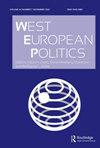Coalition agreements and governments’ policy-making productivity
IF 3.6
1区 社会学
Q1 POLITICAL SCIENCE
引用次数: 2
Abstract
Abstract One of the biggest challenges parties in multiparty governments face is making policies together and overcoming the risk of a policy stalemate. Scholars have devoted much attention to the study of how various institutions in cabinet and parliament help coalition parties with conflicting policy preferences to be efficient in the policy-making process. Coalition agreements are one of many instruments coalition partners can use to facilitate policy making. However, many scholars describe such agreements’ actual role as cheap talk, due to their legally non-enforceable nature. Do coalition agreements make a difference in the policy-making productivity of multiparty governments? To address this question, this article focuses on governments’ policy output and investigates whether coalition agreements increase the policy-making productivity of multiparty cabinets. Its central argument is that written agreements between coalition partners strengthen the capacity of coalition governments to make policy reforms, even when there is a high degree of ideological conflict among partners. To evaluate this argument, the article analyzes data on economic reform measures adopted by national governments in 11 Western European countries over a 40-year period (1978–2017), based on a coding of more than 1000 periodical country reports issued by the Economist Intelligence Unit (EIU) and the Organisation for Economic Co-operation and Development (OECD). The results show that while coalition agreements foster policy productivity in minimal winning cabinets, they play a weaker role in minority and surplus governments. Coalition agreements limit the negative effect of intra-cabinet ideological conflict on reform productivity, suggesting that such contracts help parties overcome the risk of policy stalemate.联盟协议与政府的决策效率
本文章由计算机程序翻译,如有差异,请以英文原文为准。
求助全文
约1分钟内获得全文
求助全文
来源期刊

West European Politics
POLITICAL SCIENCE-
CiteScore
10.00
自引率
7.10%
发文量
58
期刊介绍:
West European Politics (WEP)has established itself as one of the most authoritative journals covering political and social issues in Western Europe. It has a substantial reviews section and coverage of all national elections in Western Europe. Its comprehensive scope, embracing all the major political and social developments in all West European countries, including the European Union, makes it essential reading for both political practitioners and academics.
 求助内容:
求助内容: 应助结果提醒方式:
应助结果提醒方式:


